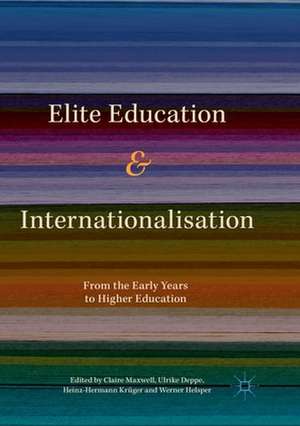Elite Education and Internationalisation: From the Early Years to Higher Education
Editat de Claire Maxwell, Ulrike Deppe, Heinz-Hermann Krüger, Werner Helsperen Limba Engleză Paperback – 22 aug 2018
| Toate formatele și edițiile | Preț | Express |
|---|---|---|
| Paperback (1) | 891.65 lei 6-8 săpt. | |
| Springer International Publishing – 22 aug 2018 | 891.65 lei 6-8 săpt. | |
| Hardback (1) | 896.84 lei 6-8 săpt. | |
| Springer International Publishing – 6 oct 2017 | 896.84 lei 6-8 săpt. |
Preț: 891.65 lei
Preț vechi: 1087.38 lei
-18% Nou
Puncte Express: 1337
Preț estimativ în valută:
170.61€ • 178.78$ • 141.05£
170.61€ • 178.78$ • 141.05£
Carte tipărită la comandă
Livrare economică 11-25 aprilie
Preluare comenzi: 021 569.72.76
Specificații
ISBN-13: 9783319867472
ISBN-10: 3319867474
Pagini: 373
Ilustrații: XI, 373 p. 7 illus., 2 illus. in color.
Dimensiuni: 148 x 210 mm
Greutate: 0.46 kg
Ediția:Softcover reprint of the original 1st ed. 2018
Editura: Springer International Publishing
Colecția Palgrave Macmillan
Locul publicării:Cham, Switzerland
ISBN-10: 3319867474
Pagini: 373
Ilustrații: XI, 373 p. 7 illus., 2 illus. in color.
Dimensiuni: 148 x 210 mm
Greutate: 0.46 kg
Ediția:Softcover reprint of the original 1st ed. 2018
Editura: Springer International Publishing
Colecția Palgrave Macmillan
Locul publicării:Cham, Switzerland
Cuprins
Chapter 1. Elite Education and Internationalisation. From the Early Years into Higher Education: An Introduction; Ulrike Deppe, Claire Maxwell, Heinz-Hermann Krüger & Werner Helsper.- PART I. Theoretical Approaches.- Chapter 2. Where Have All the Elites Gone? Cultural Transformation of Elitism in the Schooled Society; David P. Baker.- Chapter 3. Elite Formation in the Educational System: Between Meritocracy and Cumulative Advantage; Richard Münch.- Chapter 4. Exclusive Globality, Inclusive Diversity: Internationalisation as a Strategy of Inclusion and exclusion; Tobias Peter.- Chapter 5. Internationality within Business Elites and National Elite Educational Institutions; Michael Hartmann.- Chapter 6. The Work of Desire: Elite Schools’ Multi-Scalar Markets; Jane Kenway.- Chapter 7. Commentary to Part I: "Elites" and "Internationalisation" in Education Research: Essentially Contested Concepts with Great Heuristic Fertility; Reinhard Kreckel.- PART II. Early Years and Primary Education.- Chapter 8. Embedded Internationalisation and Privilege in German Early Years Provision; Johanna Mierendorff, Thilo Ernst & Marius Mader.- Chapter 9. Marketisation, Elite Education and Internationalisation in Australian Early Childhood Education and Care; Frances Press & Christine Woodrow.- Chapter 10. Choosing International: A Case Study of Globally Mobile Parents; Georg Breidenstein, Martin Forsey, Fenna La Gro, Jens Oliver Krüger & Anna Roch.- Chapter 11. Commentary to Part II: Internationalising Early Childhood Education, or ‘Embedding’ International Children into Local Contexts?; Ingela K. Naumann.- PART III. Secondary Schooling.- Chapter 12. Processes of Internationalisation in Germany’s Secondary Education System: A Case Study on Internationality in the ‘Gymnasium’; Katrin Kotzyba, Lena Dreier, Mareke Niemann & Werner Helsper.- Chapter 13. Being International: Institutional Claims and Student Perspectives at an Exclusive International School; Catharina I. Keßler & Heinz-Hermann Krüger.- Chapter 14. Elites Go Public? International Baccalaureate’s Decolonising Paradox in Ecuador; Howard Prosser.- Chapter 15. Commentary to Part III: Why is “Being International” So Attractive? “Being International” as a Source of Legitimacy and Distinction; Florian Waldow.- PART IV. Higher Education.- Chapter 16. Stratification through Internationality in the Field of German Higher Education; Roland Bloch, Reinhard Kreckel, Alexander Mitterle & Manfred Stock.- Chapter 17. Institutional Habitus of French Elite Colleges in the Context of Internationalisation: An In-Depth Look at the ‘Écoles Normales Supérieures’; Anne Schippling.- Chapter 18. Commentary to Part IV: Institutional Identities in Flux: Internationalisation and Elite-Making at Third Level; Aline Courtois.- PART V. Elite Education and Internationalisation.- Chapter 19. Internationalisation, Stratification and Elite Formation in the German Education System; Ulrike Deppe, Jasmin Lüdemann & Heiko Kastner.- Chapter 20. Making it Political: Working Toward Transformation in the Study of Internationalisation of Elite Education; Adam Howard.- Chapter 21. Changing Spaces: The Re-Shaping of (Elite) Education through Internationalisation; Claire Maxwell.
Recenzii
“This book offers an important contribution to the field of Comparative Education. Its value withstands the broad (but also in depth) detailing of possible theoretical frameworks that might be useful in analysing internationalisation, of and in, elite education. … I think that this book would be found as a valuable resource both for the newcomers to the field but also to scholars interested in globalisation in and of education and comparative education scholars interested in mobility and education in general.” (Miri Yemini, Comparative Education, February, 2019)
Notă biografică
Claire Maxwell is a reader in Sociology of Education at UCL Institute of Education, University College London, UK.
Ulrike Deppe is a post-doctoral researcher at the Centre for School and Educational Research at the Martin-Luther-University Halle-Wittenberg, Germany.
Heinz-Hermann Krüger is Professor of General Education Science at the Martin-Luther-University Halle-Wittenberg, Germany.
Werner Helsper is Professor of School Research and General Didactics at the Martin-Luther-University Halle-Wittenberg, Germany
Ulrike Deppe is a post-doctoral researcher at the Centre for School and Educational Research at the Martin-Luther-University Halle-Wittenberg, Germany.
Heinz-Hermann Krüger is Professor of General Education Science at the Martin-Luther-University Halle-Wittenberg, Germany.
Werner Helsper is Professor of School Research and General Didactics at the Martin-Luther-University Halle-Wittenberg, Germany
Caracteristici
Draws on a range of international case studies Advances how the intersections between processes of internationalisation and elite education are theorised and evidenced Comparatively explores elite education and internationalistion across all levels of education: from early years through to higher education
